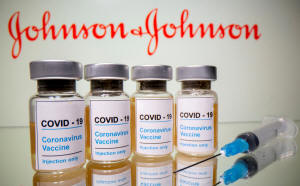J&J says second shot boosts protection for moderate-severe COVID-19 to
94%
 Send a link to a friend
Send a link to a friend
 [September 21, 2021]
By Julie Steenhuysen [September 21, 2021]
By Julie Steenhuysen
CHICAGO (Reuters) - Johnson & Johnson said
Tuesday a second shot of its COVID-19 vaccine given about two months
after the first increased its effectiveness to 94% in the United States
against moderate to severe forms of the disease.
That compares to 70% protection with a single dose.
The data will help J&J make its case to U.S. regulators for a booster
shot even as the company stresses the durability of its single-shot
vaccine as a tool to ease the global pandemic.
President Joe Biden is pushing for booster shots in the face of surging
hospitalizations caused by the Delta variant and J&J, the only drugmaker
with a single-shot COVID-19 vaccine approved in the United States, has
been under pressure to produce evidence on the effectiveness of an
additional dose.
The company has now "generated evidence that a booster shot further
increases protection against COVID-19," Dr. Paul Stoffels, J&Jís chief
scientific officer, said in a statement.

J&J said a booster given two months after the first dose increased
antibody levels four to six-fold. When given six months after the first
dose, antibody levels shot up twelve-fold, data released last month
showed, suggesting a large improvement in protection with the longer
interval between doses.
Side effects with two doses were comparable to those seen in studies
with the single-dose vaccine. The data is yet to be peer reviewed but
will be submitted for publication in the coming months.
To date, only Pfizer Inc/BioNTech SE have submitted sufficient data for
U.S. regulators to evaluate whether boosters are warranted ahead of the
Biden Administration's Sept. 20 deadline for rolling out booster shots.
A decision on that vaccine is expected this week.
On Friday, an FDA advisory committee voted to recommend emergency
authorization of additional Pfizer shots for Americans 65 and older and
those at high risk of severe illness, but voted to recommend against
broader approval, saying they want to see more data.
J&J said it has submitted data to the FDA and plans to submit it to
other regulators, the World Health Organization and other vaccine
advisory groups worldwide to inform their decision-making.
[to top of second column]
|

Vials with a sticker reading, "COVID-19 / Coronavirus vaccine /
Injection only" and a medical syringe are seen in front of a
displayed Johnson & Johnson logo in this illustration taken October
31, 2020. REUTERS/Dado Ruvic/File Photo/File Photo

The Phase III two-dose trial of up to 30,000
participants tested the effectiveness of a second dose given 56 days
after the first in adults 18 and older.
While the study found that two doses of the J&J vaccine was 94%
effective in the United States at preventing moderate to severe
disease, there was only 1 case in the vaccine group and 14 in the
placebo group, resulting in a wide confidence interval and raising
questions about the certainty of the result.
The study had a short follow-up period of around 36 days, but found
that a second dose was well tolerated, the company said.
The company also said on Tuesday that evidence from a separate real
world study of nearly 400,000 people in the United States who got
the J&J shot showed the vaccine was 79% effective at preventing
COVID-19 infections and 81% effective at preventing hospitalizations
compared with 1.52 million people of similar ages, genders and
health issues who were unvaccinated.
J&J said there was no evidence of reduced effectiveness over the
study's duration from March to late July - a period that included
the impact of the Delta variant.
Vaccine effectiveness in the real world study varied by age. For
those under age 60, the vaccine was 86% effective at preventing
hospitalization versus 78% for those 60 and older.
(Reporting by Julie Steenhuysen; Editing by Edwina Gibbs)
[© 2021 Thomson Reuters. All rights
reserved.] Copyright 2021 Reuters. All rights reserved. This material may not be published,
broadcast, rewritten or redistributed.
Thompson Reuters is solely responsible for this content.
 |